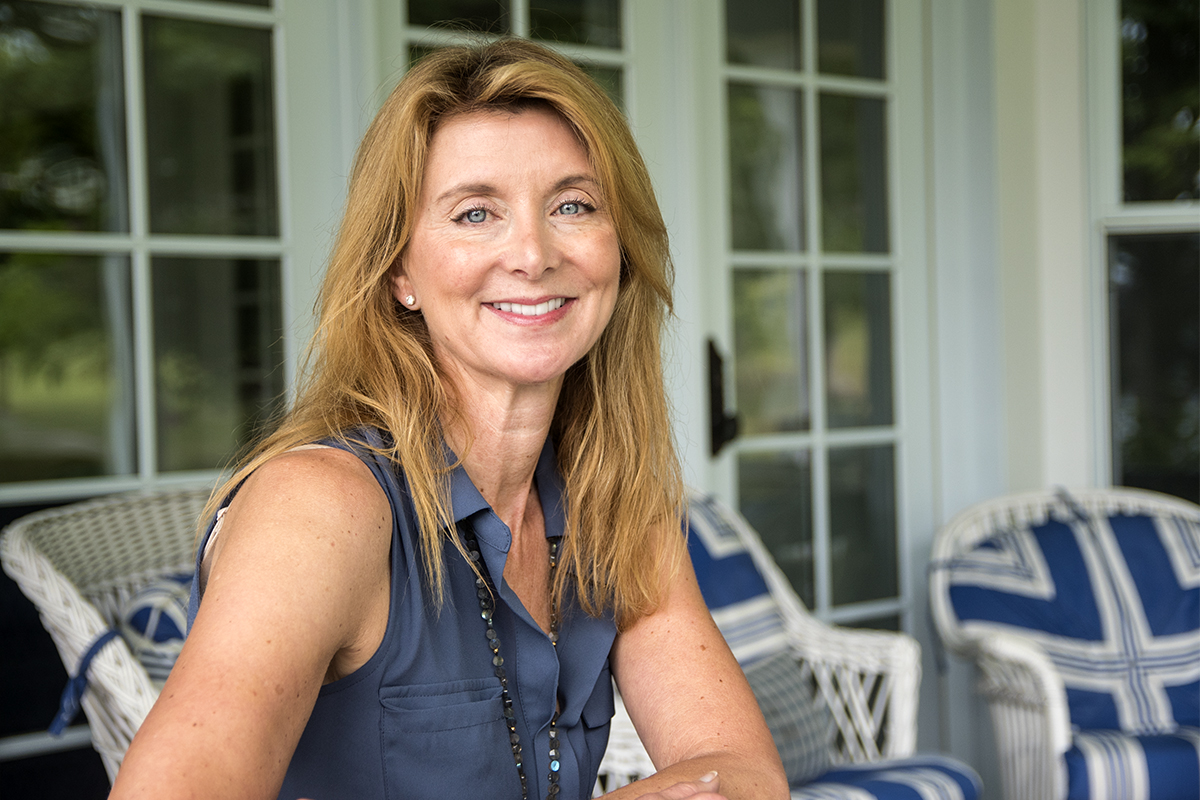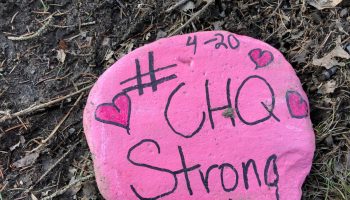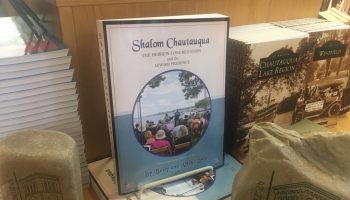Karen Goodell is hardly an unfamiliar name to many Chautauquans. A native of Chautauqua County, she has lived her entire life either as a resident of the county or maintaining a continuing affiliation with this area. Growing up in Bemus Point, she got to know Chautauqua while still in school and has spiritually never left. While she resides with her husband, Tim, in New York City during the off-season, she returns here often in pursuit of her successful real estate career on and near the grounds.
In recent years, she has assumed a growing role with the Chautauqua Foundation’s board of directors, and presently serves as its executive vice chair and chair of the Institution and Foundation’s shared Development Council. In this role, she personifies the increasing collaboration between Chautauqua Institution’s board of trustees and the Foundation board. We spoke on the capacious porch of her home off North Lake Drive.
You grew up in this area.
Yes, I grew up in Bemus Point. I’m grateful to my parents and my teachers because it was through them that I was introduced to Chautauqua. My father’s company had a subscription to the opera here, and I saw my first opera on the grounds when I was very young. One of my teachers was the very famous Winnie Lewellen1, who was the hostess at Wensley House. She had a corps of us, at least in my grade, that she could call upon when she needed extra help, or if there was an opportunity not to be missed. (Lewellen’s proud granddaughter, Journey Gunderson, is now executive director of the National Comedy Center in Jamestown, the Institution’s programmatic partner for this week.)
Because of her, I had a different point of access to Chautauqua that many kids my age may not have had, and I took advantage of the opportunities she offered. Two others of my teachers worked at Club, and yet another worked for the Daily. As local kids who did not attend Boys’ and Girls’ Club, we were fortunate in those connections to Chautauqua. I felt I could share in the experiences of some of the kids at Club, and over time, their Chautauqua also became my Chautauqua.
You had a connection to Chautauqua despite not living on the grounds here. What were some of your impressions of this place?
I did grow up living on the lake, and in a fairly new home because my father was a builder. I remember he was really intrigued by the architecture of Chautauqua, and particularly the density of housing. He didn’t understand how people who wanted to live on this beautiful lake would want to live practically on top of each other.
I have had to redefine the concept of “charming” for myself as an adult as I began to gain a fuller understanding of why people do willingly, even eagerly, choose to do that. It’s been quite a journey for me. I think that over the course of my long association with Chautauqua, I may have lived in all possible conditions here. In my realtor’s life I have come to understand, for example, why some people choose not to invest substantially in their cottage beyond the porch. I also get why some other people who are only here for a small part of the year want much more than that.
Where did you first live on the grounds?
I actually lived on Wiley because my boss at the time, Charlie Heinz, had an office there and allowed me to rent it. (Heinz later became a senior official at the Institution.) When I was in my mid-20s, I bought my first place here. It was in a building that my father renovated — in the Arcade, off Miller Park. That was my first real estate purchase on the grounds. It was so exciting!
You were already a realtor at that time?
I was. I actually got introduced to that Arcade project through a friend. My place was near the entry to the building, so for the years I lived there, people thought they were entering the Arcade but they were actually coming into my living room. That was entertaining, I can tell you. I did meet a lot of people that way.
I do think that people who buy here are buying Chautauqua. The specific space they are buying is often somewhat secondary. I feel that I’m on the Institution’s marketing team because definitely the first thing we sell is Chautauqua.
I have found that people like to live here on the grounds in a number of ways, and that’s one of the things that makes my job fun. It’s always fascinating to discover, or to help them discover, what that way is for them.
You went away to college. Was the plan to return here?
I never in a million years thought I would wind up in Chautauqua County. I actually had a great support system in Texas, where it seemed that half of Bemus Point was moving at the time. My sister was there. But one night I was at the Surf Club in Bemus, and a friend said, “There’s a job in Chautauqua you need to interview for.” I did interview a couple of days later, and left that interview having accepted the job. I guess you never know what life will bring.
This was in 1982. The way Charlie Heinz explained it, the job was very exciting to me. I could see that Chautauqua was investing in getting young families involved here. The Institution was looking at property development on the north end of the grounds, from Packard Manor up to Elm Gate, with a view to lowering the age demographic. Charlie, who had worked in government housing issues in Pittsburgh, was heavily involved in that effort.
That was 35 years ago. Those were dark financial times here. Institution leaders were looking to put Chautauqua on a more solid footing financially. The average price of a home on the grounds was around $60,000. The place was a little run-down, and there were concerns about longer-term viability.
Vacation Properties came out of that property development as the selling arm for the project. Charlie was the lead, and Bill Soffel and I were brought on board as junior partners. When I married Tim Goodell and moved to New York in 1989, I went back to being just a broker. I had gone to college with Tim’s cousin and so I knew his family somewhat, but I did meet him here through mutual friends.
New York City is your primary residence?
Yes. We raised our kids in the city. I always would come back to Chautauqua a couple of times every month for my business, but New York was our home. My family was here in Chautauqua County, and I still had lots of friends here. It’s a wonderful balance and counterpoint to life in the city. I could always recalibrate here. And to this day, Chautauqua is a place where my family can come together. It’s a gathering place.
How did you get started with the Chautauqua Foundation?
I was a volunteer initially. Sometime along the line, I was asked to help with the Chautauqua Fund. It was at that point that I got my first introduction to the operations of Chautauqua Institution. I had not previously understood just how dependent on philanthropy Chautauqua was — and is. Philanthropy here is such a collection of great individual stories. Frankly, I had not expected to enjoy the work, but I did, very much.
Right around 20 years ago, I was asked to chair the Renewal Campaign. I felt lucky to be included in an effort that was clearly so critical to the Institution. That campaign was particularly special to me because it included a number of the local foundations. It was heartwarming to watch those partnerships evolve. As the result of that campaign, there were big investments possible in youth activities and the Welcome Center at the Main Gate.
In a way, that work at the Main Gate serves as a kind of precursor to (Institution President) Michael E. Hill’s emphasis on developing and expanding our ties to the local community. I think that with the Amp project behind us, the Institution’s leadership team can devote more time to these local ties, and I very strongly support that. I think we can be part of all that is happening in the Jamestown area and in the county, and we should be.
Local foundations like Gebbie, Lenna, Sheldon and Hultquist had been active supporters of the Institution for a period of years. Then they turned more attention to Jamestown. Could they be enticed back?
Their decision to focus on Jamestown and the local communities certainly was understandable. But I see so many possibilities for re-engagement. How could we — the foundations and the Institution — leverage shared passions and purposes for everyone’s benefit? I am optimistic — very, out-there optimistic, not cautiously optimistic — that it can happen. It is on Chautauqua for that to happen. But it can happen and it will happen.
If you add in all the seasonal employees, the Institution must be one of the largest employers in the county. We’re a big regional economic and employment engine. Every organization that supports Chautauqua looks at that, and they should. It’s important.
The Institution and the community certainly share the lake.
Yes. Chautauqua has been a leader as an organization on concerns about the health of Chautauqua Lake. As someone who grew up on the lake, this is also very high on my personal list of concerns. That’s a whole separate topic, but clearly one that is vitally important to this region.
Ideas and vision have been at the heart of many Chautauqua Foundation campaigns. How does the Institution handle new ideas?
This place is amazing in the quality of intellects it continues to attract. There is so much talent on the grounds. I know people take ideas to the administration and there can be frustration when they are not always implemented. I do think when people bring ideas, administration officials may sometimes listen with an ear also to what is financially possible to implement. It is certainly not hard to understand either perspective. But the doors must always be open to new ideas. It seems to me, though, that this is a good problem to have. Would you rather have a group of Chautauqua stakeholders who didn’t care enough to bring ideas forward?
Foundation volunteers should be in a great position to harvest new ideas.
That is certainly true. We meet people and sit in their living rooms. We want to know what they are interested in. Getting from idea to implementation obviously depends on financial resources, among other things. But again, it’s a good problem to have.
I saw where Cathy (Bonner, Foundation board chair) said it takes 10 years to get established at Chautauqua. We certainly see that at the Foundation in the sense that, initially, many people come here to get away from meetings, not to attend more of them. This is a place to enjoy family and growing friendships and just being in Chautauqua. For many, it takes some time before real roots begin to form. A kind of sly affection develops for many, and sometimes that turns into a full-blown love affair. From that intensifying involvement ideas naturally flow.
What is your history with the Foundation board and the Development Council?
I became a member around 2001. Now as executive vice chair, I preside in the absence of our chair. I also chair the Development Council. There are three trustees and three Foundation board members. There are some community members. The council has been around for a long time, but at present it is being reimagined in what I see as a major way.
A big change is that one part of the council will focus on and look at what our donors want now, in 2017. This is different than a strategic plan. It’s more of a bottom-up process, if you will. It will be concentrated on individuals and their thoughts and ideas. The concept is to capture these desires and see about building them into some kind of strategic plan. This is a donor-centric approach. It’s “What do you want for Chautauqua?”
We might do what you might call mini-campaigns. One might be centered on Bellinger Hall. Cathy discussed that in the Daily, and it is clearly central to President Hill’s vision. Bellinger wasn’t fully addressed in the Promise Campaign, but it is an evident priority.
You sound excited about the possibilities for Chautauqua.
Right now, at this period in Chautauqua’s long history, I think things are aligned for us to get out there and do some really good work. I love Michael Hill’s vision. The relationship between the board of trustees and the Foundation is strong, collaborative and very mutually supportive. It is time for us to move.
I think Michael has an opportunity to demonstrate far beyond this county the work Chautauqua does in pursuit of the best in human values. These Chautauqua values can again be at the heart of a movement. When communicated more broadly to organizations and individuals who may not know about us but whose missions align with ours, there is a breadth of possibility. Living in New York City, I would hope to be part of this broader outreach.





